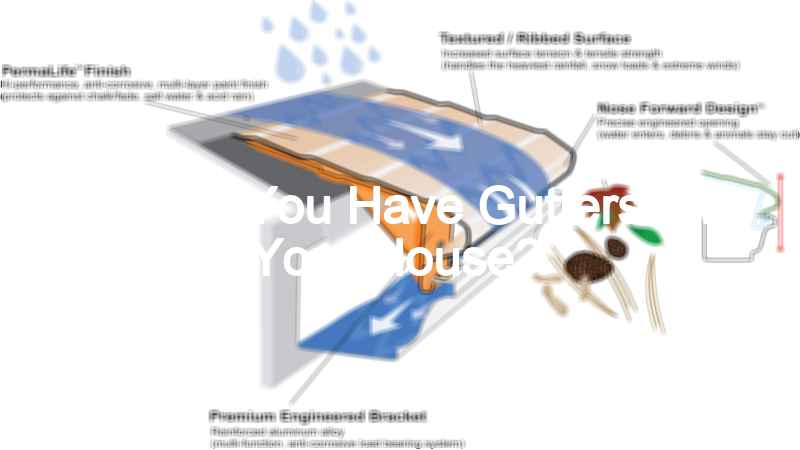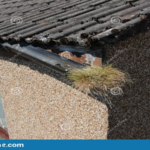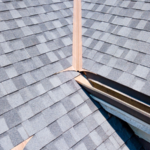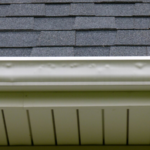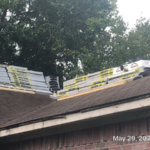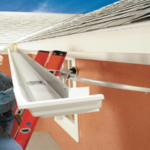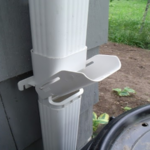There are a few schools of thought on this one – some people believe that gutters should only be installed on homes that have a slope or incline, as rainwater will naturally drain away from the house without them. Others believe that gutters are a necessary addition to any home, as they help to protect the foundation and prevent water damage.
There are a few factors to consider when making your decision. If your home is located in an area with a lot of rainfall, then gutters can help to prevent water from pooling around the foundation and causing damage. They can also help to keep your basement or crawl space dry, as water that seeps in can lead to mold and mildew growth.
If your home is on a slope or incline, you may be able to get by without gutters, as long as the grade is sufficient to allow rainwater to drain away from the house. However, if there is any chance that water could pool near the foundation or if your basement is prone to flooding, then gutters are a good idea.
In the end, it’s up to you to decide whether or not to install gutters on your home. If you’re unsure, it’s always best to consult with a professional to get their opinion.
How many gutters should a house have?
- Most houses have four gutters, one on each edge of the roof.
- If your house is particularly large or has a complex roofline, you may have more gutters.
- Gutters protect your home from water damage by channeling rainwater away from the foundation and walls.
- If you live in an area with a lot of rainfall, you may want to consider installing additional gutters or upgrading to a sturdier gutter material to help protect your home.
Is it better to have gutters or not?
There is no one definitive answer to this question as it depends on a number of factors. Some people believe that gutters are essential in order to protect a home from water damage, while others find them to be unnecessary and a potential source of maintenance problems. Ultimately, it is up to the homeowner to decide whether or not to install gutters, based on their specific needs and preferences.
Why would you not put gutters on a house?
There are a few reasons why someone might choose not to install gutters on their home. Gutters can be a significant expense, and they require regular maintenance to keep them clear of debris. They also can be a source of leaks if they are not installed properly. Furthermore, in some areas of the country, gutters are simply not necessary because of the climate.
Do gutters increase home value?
So, while gutters may not be the most exciting home improvement, they can definitely be a worthwhile investment. Not only can they help to protect the home from water damage, but they can also help to keep the landscaping looking its best.
Are 6 gutters worth it?
In most cases, six gutters should be plenty to keep your home dry and protected from water damage. However, if you live in an area with a lot of rainfall, or if you have a large home or a roof that is prone to leaking, you might need more than six gutters to keep your home safe.
What can happen if you don’t have gutters?
If you don’t have gutters, rainwater can pour down the sides of your house and damage the foundation, siding, and landscaping. Gutters also help to prevent ice dams from forming on your roof in the winter.
Why do Florida houses not have gutters?
There are a few reasons for this. One reason is that the climate in Florida is such that there is not a lot of rainfall, so there is no need for gutters to protect against water damage. Another reason is that Florida homes are typically built on stilts, which helps to keep them dry during the rainy season. Finally, gutters can be a source of maintenance and repair issues, so many homeowners prefer to avoid them altogether.
Why do houses in Texas not have gutters?
There are a few reasons for this. One reason is that the climate in Texas is such that gutters are not really necessary. The rainfall is not heavy enough to warrant them, and the temperatures are not cold enough to cause any significant buildup of ice or snow. Additionally, many people in Texas believe that gutters can actually do more harm than good. They can trap leaves and debris, which can then lead to water damage and even mold growth.
Are most gutters 5 or 6?
There is no definitive answer to this question as the size of a gutter can vary depending on the size and type of building it is being installed on. However, the most common size for a residential gutter is 5 inches, while the most common size for a commercial gutter is 6 inches.
Bottom Line
There are a few things to consider when deciding whether or not to install gutters around your house. The climate and weather conditions in your area, the type of roof you have, and the type of landscaping around your house are all factors to take into account. In general, gutters can help to protect your home from water damage and can also help to keep your foundation in good condition. If you are unsure about whether or not to install gutters, you may want to consult with a professional to get their opinion.
